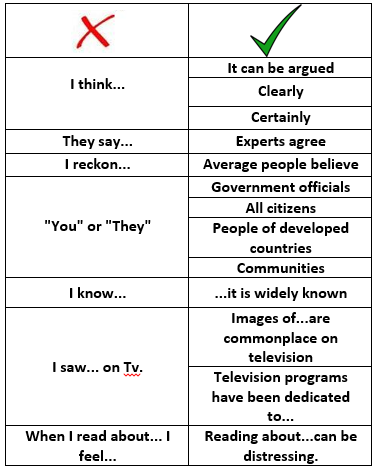
What Is Point of View?
In writing, point of view refers to whether the writing takes on a singular or plural perspective in either 1st person, 2nd person, or 3rd person.
- First person is the perspective of the writer; 1st person uses words like “I,” “my,” “me,” or “we.”
- 2nd-person is the perspective of the reader being directly addressed by the writer; 2nd person uses words like “you,” “your,” or “us.” ; and
- 3rd-person is the perspective of a different party who is neither writer nor reader. 3rd person uses words like “she,” “his,” or “they.”
Point of view can typically be identified by which pronouns are used. See the chart below for a quick summary.
| Point of View | Pronoun |
| First Person | I, Me, My/Mine We, Us, Our/Ours |
| Second Person | You, Your/Yours |
| Third Person | He, Him, His She, Her/Hers It, Its, They, Them, Their/ Theirs |
Related concepts: Pronouns, Perspective, First-Person Point of View, Second-Person Point of View, Third-Person Point of View
Why Does Point of View Matter?
Point of view can impact how a reader experiences a piece of writing in a wide range of ways. A writer’s choice of point of view can impact the level of formality of a piece of writing, and it can also impact how a reader feels about both the writer and the topic. Choosing to use the first person pronouns “we” and “us,” for instance, might make a reader feel in league with the writer, but in another rhetorical situation it can make readers see the writer as unserious or subjective. In fiction, a writer’s choice of point of view means deciding through whose eyes readers see a story, which in turn impacts just about every other choice a writer will make, from which information readers will get, to how they will perceive other characters and events.
How Do You Choose a Particular Point of View?
Point of view is
- a stylistic choice–i.e., choice based on the rhetor’s desired Rhetorical Stance.
- defined by genre.
- Genres tend to have very specific guidelines for point of view.
- defined by the rhetorical situation, especially the intended discourse community/community of practice.
- In academic writing, e.g., writers are generally expected to use 3rd-person most of the time, with the occasional exception for 1st person if it is necessary. Using 2nd person is discouraged.
Different points of view can be applied to different writing purposes. There are far too many reasons to choose a point of view to list them all here. This list provides three common uses for the various points of view:
Common uses of 1st person
- Memoirs. Memoirs are all about someone’s personal experiences, so memoir authors use I frequently to describe what has happened to them and how they felt about it.
- Certain academic disciplines. Some academic disciplines, like women’s studies and rhetoric and composition, value the inclusion of personal experience as research material, so scholars will use I and we in their work.
Common uses of 2nd person
- Directions and Self-help books. Self-help books aim to improve their readers in some way, so the authors use you to speak directly to those readers and prompt them to reflect on themselves or take action.
- Advertisements. Advertisements target specific audiences in order to make sales, and the use of you (e.g. “Do you need cash fast?”) can prompt a viewer to identify with the ad’s target audience.
Common uses of 3rd person
- Quotes. When relaying quotations from other speakers or writers, authors will identify the source of the quotation in 3rd person, as in “He wrote that…”
- News stories. Journalism generally strives to impart objective information. By using only 3rd person, journalism avoids the overly personal tone of I and you.
Here are the common ways third person is used in an academic paper:

Note: While the above pronouns represent the third person, instead of using it, that, these, those or this, specific words or phrases will better help readers follow the writer’s logic.
How To Edit for Point of View
To identify ineffective uses of point of view, 1) identify the various points of view in your writing; and 2) decide if the points of view achieve their purpose and will not inadvertently alienate the reader.
1. Identify the various points of view in a piece of writing.
Ex: The American public is underinformed about important news from other countries. When you only watch local cable news or get your news from American websites, you miss out on reading about events like the Arab Spring and the tsunami in Japan.
In this example, the first sentence has a subject in 3rd-person point of view, the American public. The second sentence’s use of you gives it a 2nd-person point of view.
2. Decide if the points of view achieve their purpose and will not inadvertently alienate the reader.
Ex: The American public is underinformed about important news from other countries. When you only watch local cable news or get your news from American websites, you miss out on reading about events like the Arab Spring and the tsunami in Japan.
In the first sentence, 3rd-person point of view achieves the purpose of identifying who the writer thinks is underinformed: the American public. In the second sentence, though, it is unclear what purpose the 2nd-person you is intended to achieve. Why is the writer speaking directly to me, the reader? Moreover, the writer risks alienating me by seeming to assume that I am definitely uninformed. How (potentially) offensive!
How can you correct an unnecessary shift in point of view?
- In a passage where an unnecessary shift has been noted, go through and highlight each of the point of view words.
- Change the point of view of the inconsistent pronouns to align them with the primary point of view that has already been established.
- Reread the passage aloud and listen for consistency in point of view.
Let’s look at an example:
- Inconsistent point of view:
- Even though he believed weight loss was possible, you do not know how hard it can be until you try to lose a few pounds.
- Consistent point of view:
- Even though he believed weight loss was possible, he did not know how hard it would be until he tried to lose a few pounds.
How do you change first or second person to third person?
Here is a table that shows several common instances of first or second person in essays and some examples of how to revise to the third person.

To identify ineffective uses of point of view, 1) identify the various points of view in your writing; and 2) decide if the points of view achieve their purpose and will not inadvertently alienate the reader.
1. Identify the various points of view in a piece of writing.
Ex: The American public is underinformed about important news from other countries. When you only watch local cable news or get your news from American websites, you miss out on reading about events like the Arab Spring and the tsunami in Japan.
In this example, the first sentence has a subject in 3rd-person point of view, the American public. The second sentence’s use of you gives it a 2nd-person point of view.
2. Decide if the points of view achieve their purpose and will not inadvertently alienate the reader.
Ex: The American public is underinformed about important news from other countries. When you only watch local cable news or get your news from American websites, you miss out on reading about events like the Arab Spring and the tsunami in Japan.
In the first sentence, 3rd-person point of view achieves the purpose of identifying who the writer thinks is underinformed: the American public. In the second sentence, though, it is unclear what purpose the 2nd-person you is intended to achieve. Why is the writer speaking directly to me, the reader? Moreover, the writer risks alienating me by seeming to assume that I am definitely uninformed. How (potentially) offensive!
Exercises
Look at the following lines and determine how you might revise them so that they remove the pronoun “you” or define the pronoun “we”:
- You can understand what it’s like to have a stack of papers to grade and only two days to do it.
- We now know that cigarettes can cause various types of cancer.
- I would like you to understand that not all students are lazy.
- We believe that gay marriage is not immoral or harmful to the American family; as such, we argue that it should be legalized.
- Doughnuts are really harmful to our health, so we should stop ingesting them.
- If you would only give reading a try, you might actually enjoy it.
- Subliminal messages enter our psyches on a daily basis.
- As a feminist, I believe that women should receive pay that is equal to that of their male coworkers.


